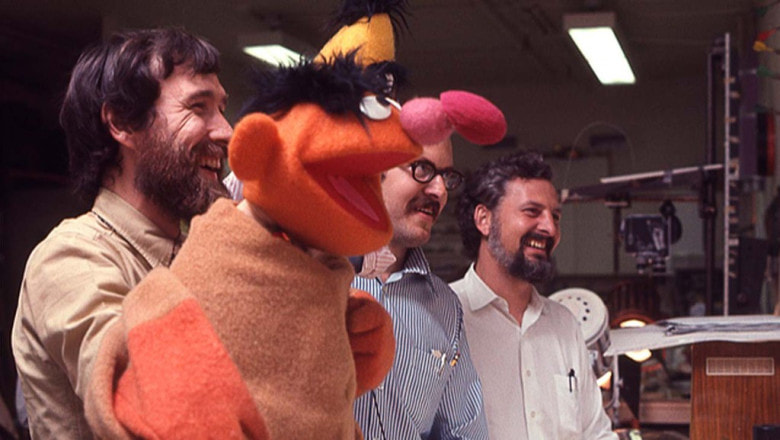Review: 'Street Gang: How We Got to Sesame Street,' it's not easy being green, or brilliant4/29/2021 The only negative thing I could say about the new documentary, "Street Gang: How We Got to Sesame Street," is that i didn't like the end...in that I wish it could have gone on forever. That's how I felt watching it. This incredibly insightful, hilarious and heart-warming documentary is one part origin story, describing how a group of tremendously talented and motivated people all got together at just the right time and place in history to create something timeless. It's also a celebration of what was created, and what was achieved, in a television landscape that was like the Wild West, unexplored and primed for pioneering. Then it's an inspirational trip down memory lane...nostalgia served up in delicious spoonfuls...that made me long for simpler times. Watching "Street Gang," I was a kid again, and was made to feel thankful that I - like millions of other children - grew up on "Sesame Street." But as an adult looking back, the love and appreciation is deeper by a hundredfold, especially when you realize just how daring, bold and innovative "Sesame Street" really was. "Sesame Street," as one person puts it in the film, "is Television if Television loved the audience, instead of just trying to sell to it." This love permeates through "Street Gang" and makes it one of the most effective, insightful and yes even important documentaries of our time. Grade: A+Relying on an extraordinary amount of archive footage that really puts you back in time, "Street Gang" is a film for everyone. We all know the name Jim Henson and even his puppet counterpart Frank Oz, but many aren't aware that "Sesame Street" wasn't their creation at all. The film tells us how the two real instrumental figures in bringing "Sesame Street" to life were producer Joan Ganz Cooney, and writer/director producer Jon Stone. The rest of the "Street Gang" of original contributors and stars behind-the-scenes are also highlighted, including the sensational Joe Raposo, the musical whiz who not only came up with the show's theme song, "Sunny Days," but wrote nearly every single musical number or ditty that appeared in the first several years of its creation. The general idea behind "Sesame Street" was quite simple: Cooney and Stone wanted to use television as a tool to educate young children, and especially young inner-city children. The "Street" setting was chosen for this particular reason, and there was always a push for inclusion, tolerance, friendship and love. The Muppets that appear on the show (many of whom were created by Stone), were originally going to appear separate of the Street's human residents, but the human-only segments were scoring poorly with children in test results. That led them to the idea of putting them right on the Street, further pushing the idea of integration and harmony among those that are different. Speaking of those that are different, there was nobody like this group or "Sesame Street" originators...they were a perfect storm that would water the seeds of several generations of people all over the world. Who knows, "Sesame Street" might not have been the first or the only educational TV program for kids, but because it was far and away the best, the rest have been lost to history. Whereas the recent ABC special "Sesame Street: 50 Years of Sunny Days" focused almost entirely on the show's legacy and impact, "Street Gang" almost entirely focuses on the show's earliest days. They are great supplemental pieces of entertainment, with "Street Gang" being leaps and bounds more important and effective, ultimately. The sheer amount of archival footage is astounding, and surely it contains stuff that no one outside The Sesame Workshop has ever seen. There are new and old interviews woven in, from cast members to archival interviews with Jim Henson and Joe Raposo, to a new interview with the one-and-only Joan Ganz Cooney, still rockin' at the young age of 91. There's a fascinating segment on the "first" Gordon, Matthew Robinson, who also was responsible for one of the show's most memorable (and controversial) characters, Roosevelt Franklin. The documentary didn't know it at the time, but in trying to preserve and tell memories of "Sesame Street"s origins, it also bottled up some incredible new footage that it might not have known at the time was so important. I'm referencing "new" interview footage with Carroll Spinney, the iconic voice and puppeteer of Big Bird, who also voiced Oscar the Grouch. A scene of him revealing his love for both characters is unforgettable, as is his legacy. Like "Street Gang," I wish I could go on and on. There is no weak point, no uninteresting tidbit, no false note and nothing that seems unexplored. But more than that, it captures the very essence of what "Sesame Street" was: Education that was so fun, you didn't mind learning. Watching "Street Gang" was fun and educational in the same vein, and it was also tremendously refreshing...a reminder of a place that existed - and still exists - where people of all color, creeds and backgrounds could live together in peace, happiness and laughter. It may have only existed on a television set, but it's legacy lives on in all of us. Grade: A+ Genre: Documentary, History. Run Time: 1 hour 47 minutes. Rated PG. Based on the book by Michael Davis. Directed by Marilyn Agrelo ("An Invisible Sign," "Mad Hot Ballroom"). "Street Gang: How We Got to Sesame Street" is available on Friday, April 30th, 2021.
0 Comments
Leave a Reply. |
Looking for a specific movie or review?
Search Below: Categories
All
Archives
May 2024
|
tom santilli movie reviews
Tom Santilli is a professional film critic, TV personality, host and
the Executive Producer of Movie Show Plus.
He also is the featured film critic appearing on WXYZ Channel 7 Action News in Detroit,
and appeared weekly on FOX-2 in Detroit from 2016-2020.
Feel free to use the "search" below to find your favorite titles.
TOM'S GRADING SCALE:
B- and above: Thumbs Up
C+ or below: Thumbs Down
Currently Airing:Check Local Listings
|
For more information on Movie Show Plus, Email: |


 RSS Feed
RSS Feed
